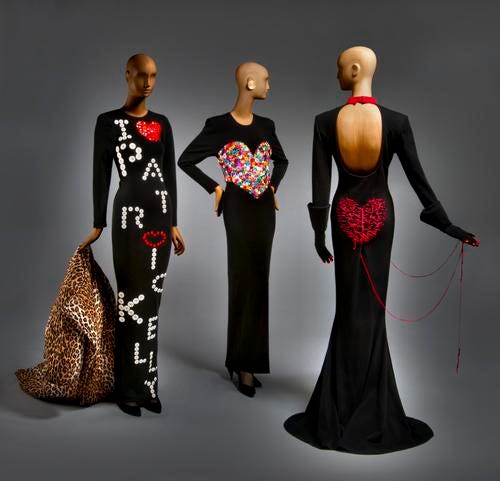How does selling what you create change your creativity?
Thoughts and musings on the intersection of art, psychology and business
A few years ago at the beautiful Patrick Kelly fashion art exhibit at DeYoung Museum, the curator speaking to us highlighted how Kelly’s work went from "unfettered creativity entirely about the design" to a new version with production in mind. For example, he created these AMAZING bolero jackets except it's not actually a jacket, it's buttons sewn on a knit jersey dress to such exact specifications that it looks like a jacket over a dress. Later, he would create knit dresses and then sell them along with bags of the buttons. People could customize their own designs, allowing them their own creative freedom, but this was also a production design. The product started out one way, born entirely of his free creativity, but then shifted into something that could be produced and sold.
Neither of these things, “unfettered creativity” or designing for production is bad nor good. They're just a fact of creative life when you decide to make your art also your business or way of earning a living. When no one is watching anything that you do, it's all about your pure creative impulse. Once it comes to needing to sell a creative product or service, you have to make decisions that some might say are compromises. Compromises aren't a bad thing. Patrick Kelly's designs blew up - he could reach more people and get more money. And in some ways, getting money for the next collection furthered what he could do creatively, right? Because obviously you can't do as much without any money as you can if you have access to the art materials you truly want to use.
I know working as a writer for over a decade has significantly changed my writing. When I was just writing journals and letters and attempts at stories, I wrote a certain way. After years of writing to the specifications of online and offline publications, churning out content, writing in different voices for different clients ... it has changed. Again, neither good nor bad. I've had opportunities to write in ways I never would have imagined and couldn't have done if writing weren't the way I make a living. I also sometimes feel like I've forgotten the raw pure part of my creative writing in the process. A lot of why I continue to write daily posts, journals, free writing, creative writing is because I want to consistently refocus on my own “unfettered creativity”, without the rules of my various writing jobs. I'm not sure I'm fully succeeding but I'm getting closer.
So, I was curious about how other people felt about this ... about how selling what you do creatively changes your relationship with your creativity. I asked over on Instagram at one point and got a few overwhelming responses. I should say that the people following me there are primarily independent knit, crochet, fashion designers who make some or all of their living off of that work, so that was the context most responded in.
A few people said that they didn't feel like sharing their creativity had changed it. Several, however, said that they began to notice what the market or customers want more and began adapting their creativity accordingly. None who commented seemed bothered by this and maybe there was even some excitement in how this encourages them to problem-solve and pivot quickly which can be a form of creativity in itself.
“knitabitcrochetaway” said,
"When my creative expression starts feeling too much like a business, I take a step away to ground myself and bring it back to the creative process."
I really love this. I think it's so important. I also think it's really hard when you're trying to make a living because making a living off of creative work isn't easy. So I think this is what to strive for but I think it's a challenge.
Also I think a lot of us solopreneurs / artists / makers / indie business owners feel a ton of pressure. Most of us aren't "big" enough to hire people to do a lot of our work. So, for example, a crochet designer isn't just sitting there playing with yarn and designing crochet. They're blogging which means learning about SEO and social media and online marketing and advertising and the legal rules about disclosures if you work with affiliates, etc etc etc. They're writing up and formatting the designs, fielding questions from people who didn't understand the pattern, constantly looking for publications willing to pay for the pattern and then having to negotiate those rights. Which means they're wearing a lot of hats, and it feels like they have to be the best at all of them when each is a full-time job in its own right. And they're doing it while raising kids or taking care of parents or just trying to have a life.
The flip side of running your own creative business is working for someone else. I, for example, do some writing work for large businesses. I can count on a consistent paycheck, someone else does the research about what to write, they handle the promotion and website problems, and whatever else comes up in the business. I write and get paid. The downside of that is that I have to compromise my creativity a lot because I'm doing the work for someone else. The content, the style of writing, the way it’s promoted … for better or worse, I don’t decide those things.
Neither good nor bad. Just things to think about. And then, of course, mental health comes in through all sorts of ways. If you're working entirely for yourself then you have stress (coming out at you from clients/customers, coming from yourself about what you want to accomplish, overwhelm, financial concerns, etc.) If you're working for someone else, there's stress from that situation as well; coworkers, deadlines, feedback, meetings. In either case, what if you're dealing with mental health symptoms one day? What if you're stuck in a bad period of depression and all that you're doing isn't helping and it feels like you can't get out of bed for a week? How does that affect your work, your sales, let alone your creative impulse? Can you drag yourself to do the work and if so, do you feel at all creative doing it? Can you do something else creative, outside of the work, to try to lift your mood and shift things? Or do you lay there feeling even more overwhelmed and worthless and hopeless because you can't make yourself get up and create? The response is different if you work creatively for yourself vs. for someone else.
The answer for me is all of the above at different times. My entire relationship with my creativity shifts over time. As does my relationship with my work. Sometimes those two things are the same and sometimes not. And my mental health plays a factor in ways I sometimes understand and sometimes don’t. What I know is that there’s a deeply important intersection between creativity, work, mental health, and income, and I’m regularly trying to understand it better in order to perhaps occasionally offer insights that are helpful to others.
So, I’d love to hear your responses:
How does selling what you create change your creativity?
If you read this far, perhaps you liked the work. The work does take work. It only continues with support, so please consider subscribing. My annual rate starts at $10 per year.








I can’t give a simple answer to this because my creativity has gone through different phases and my relationship to it changes all the time. When I was making textile products to sell I hated how I’d become a production line, making the same thing over and over again—it was unfulfilling. When I shifted into the art world I loved being able to express myself fully but hated the drop in income! Maybe there’s no clear answer to this conundrum within a capitalist system that demands we ‘produce’ something to sell or sell our labour. Right now I try and balance making money from other activities with making the art I want to make, but that may change again in the future.
This is something I’ve thought about quite a bit over the years. At one point, I actively wanted to turn my art into a business, but the sheer amount of work that entailed meant I had hardly any time to actually make art, since I was also holding down a 9-5. And though I quickly realized that I wasn’t enjoying it at all, I stuck to that path for a while because I couldn’t decide if I was giving up or didn’t actually enjoy it. (Crazy that we believe the messaging around these things more than our lived experience sometimes!)
Now I’m at a happy medium — I don’t rely on my art for money, though I do make the occasional course and teach online. The focus now is on things I enjoy making and teaching, and I do it more for fun than for it to be how I make my living.